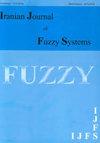On the properties of the fuzzy weighted average of fuzzy numbers with normalized fuzzy weights
IF 1.2
4区 数学
Q1 MATHEMATICS
引用次数: 2
Abstract
Weighted average with normalized weights is a widely used aggregation operator that takes into account the varying degrees of importance of the numbers in a data set. It possesses some important properties, like monotonicity, continuity, additivity, etc., that play an important role in practical applications. The inputs of the aggregation as well as the normalized weights are usually not known precisely. In such a case, their values can be expressed by fuzzy numbers, and the fuzzy weighted average of fuzzy numbers with normalized fuzzy weights needs to be employed in the model. The aim of the paper is to reveal whether and in which way the properties of the weighted average operator can be observed also for its fuzzy extension. It is shown that it possesses three conditions characteristic for aggregation operators -- identity, monotonicity and boundary conditions, and besides that, also compensation, idempotency, stability for linear transformation, 1-lipschitzianity, and continuity. Furthermore, it is proved that it preserves strict monotonicity in case of positive fuzzy weights, and symmetry in case of equal fuzzy weights, although it does not coincide with the fuzzy arithmetic mean operator in such a case. One of the most valuable result of the study is the fact that in contrast to the crisp weighted average operator, it is not additive. The importance of the obtained results is discussed and illustrated by several illustrative examples.模糊数归一化模糊权值的模糊加权平均的性质
具有归一化权重的加权平均是一种广泛使用的聚合算子,它考虑了数据集中数字的不同重要程度。它具有单调性、连续性、可加性等重要性质,在实际应用中起着重要作用。聚合的输入和归一化的权重通常是不精确的。在这种情况下,它们的值可以用模糊数来表示,需要在模型中采用模糊权值归一化的模糊数的模糊加权平均。本文的目的是揭示加权平均算子的模糊可拓性是否可以观察到,以及如何观察到。证明了它具有集合算子的三个条件特征——恒等、单调和边界条件,此外还具有补偿、等幂、线性变换稳定性、1- lipschitziity和连续性。进一步证明了它在模糊权值为正的情况下保持严格单调性,在模糊权值相等的情况下保持对称性,尽管在这种情况下它并不与模糊算术平均算子重合。该研究最有价值的结果之一是,与脆加权平均算子相比,它不是加性的。讨论了所得结果的重要性,并通过几个实例加以说明。
本文章由计算机程序翻译,如有差异,请以英文原文为准。
求助全文
约1分钟内获得全文
求助全文
来源期刊
CiteScore
3.50
自引率
16.70%
发文量
0
期刊介绍:
The two-monthly Iranian Journal of Fuzzy Systems (IJFS) aims to provide an international forum for refereed original research works in the theory and applications of fuzzy sets and systems in the areas of foundations, pure mathematics, artificial intelligence, control, robotics, data analysis, data mining, decision making, finance and management, information systems, operations research, pattern recognition and image processing, soft computing and uncertainty modeling.
Manuscripts submitted to the IJFS must be original unpublished work and should not be in consideration for publication elsewhere.

 求助内容:
求助内容: 应助结果提醒方式:
应助结果提醒方式:


